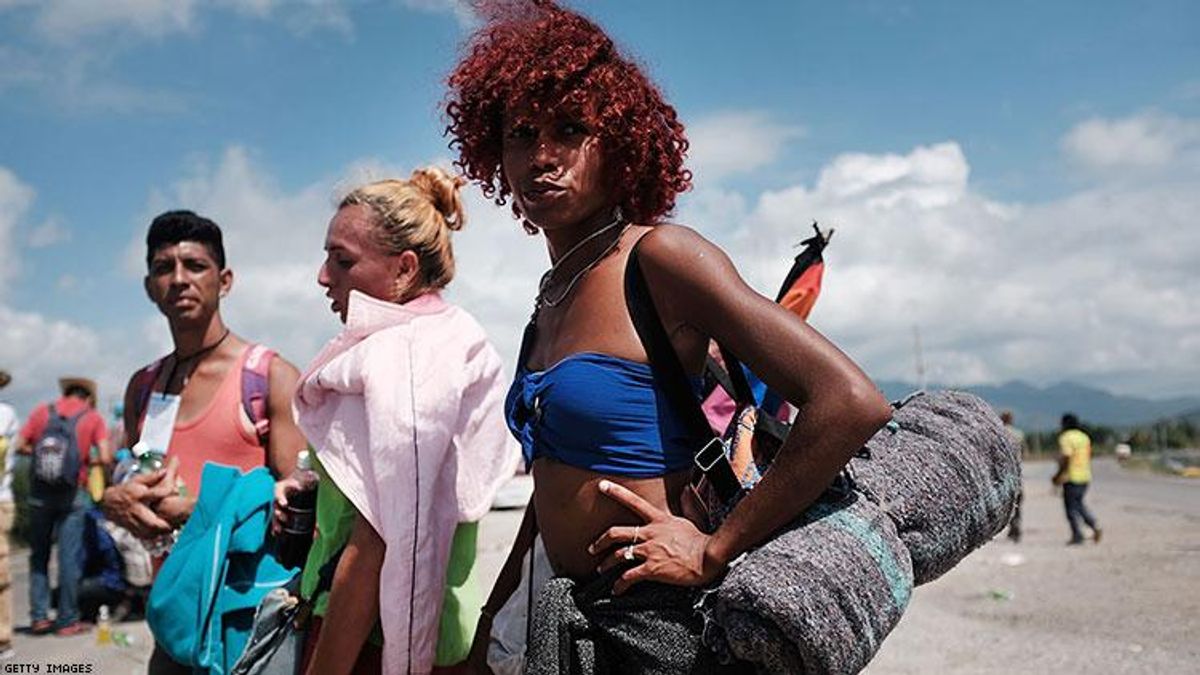Transgender and nonbinary detainees at a U.S. Immigration and Customs Enforcment detention facility in New Mexico say they've received inadequate medical treatment and allege abuse from detention guards, according to the Arizona Mirror.
Twenty-nine migrants detained in ICE's only transgender unit, the Cibola County Correctional Center, handwrote and signed a letter in late June accusing guards at the facility of abuse and medical neglect.
"There is no adequate medical attention to treat people with disabilities, HIV-positive people, those with skin infections (some of which were acquired here), and several of our peers lack medications. We fear retaliations, but more so we are afraid of being in this situation," the detainees wrote, according to a translation from the original Spanish.
"Some officials mistreat us daily, verbally and psychologically assaulting us," the migrants added.
Cibola has a history of neglecting detainees and questionable deaths. The facility is owned by the Correctional Corporation of America, a private company, but had a contract with the Bureau of Prisons. Cibola operated as a federal prison for 16 years until the contract was ended four years early, in 2016, after The Nationinvestigated the facility.
A Nation reporter "obtained tens of thousands of pages of medical reports through an open records lawsuit and, working with a panel of medical doctors, found more than two dozen deaths involving substandard care," according to the magazine.
Later, seven organizations, including the American Civil Liberties Union, investigated Cibola and reported abuse and neglect of detainees. In their report in April of this year they listed that the center had inadequate medical and mental health care, abuses related to solitary confinement, discrimination and verbal abuse, and inappropriate meals, among other issues.
There was also a case of a transgender woman dying in Cibola in May 2018. Roxsana Hernandez, a 33-year-old Honduran trans woman seeking asylum, died in custody at Cibola. Many believe it was due to medical neglect.
"Days after she presented for asylum and was detained, Department of Homeland Security officials rushed Roxsana to an emergency department in Chula Vista, California. Once there, she was diagnosed with cough, congestion, fever, and unmedicated HIV. Despite the overwhelming medical consensus as to the standard of care in such situations, she was not admitted for treatment or monitored," according to the Transgender Law Center.
The Transgender Law Center also reported Hernandez's autopsy report indicated blunt force trauma to her head, deep tissue damage, and handcuff injuries.
The letter from detainees directly contrasts with the summer camp-like images shown to the media last month by Immigration and Customs Enforcement. Reporters from the Washington Blade toured Cibola, but did not get a full look at the facility.
"The reporters were not allowed to speak with individual detainees and were not granted access to the unit in which detainees are held in solitary confinement. The reporters were also not allowed to bring telephones or recording devices into the facility," the Blade reported last month.
"Officials from our unit have carried out activities to create an opposite image of reality," the migrants said in response to ICE's portrayal of Cibola. "They deceived us, forcing us to sign documents that weren't explained at all. We didn't even know what they were about."
ICE spokeswoman Leticia Zamarripa responded to the migrants' letter, according to the Mirror.
"ICE takes seriously all allegations and investigates them thoroughly," Zamarripa said. "However, ICE cannot research or provide individual comment on any allegations, including alleged medical mistreatment without the specific details. ICE encourages such specific reporting so that all allegations can be thoroughly researched and corrected, if necessary, or debunked."
ICE has updated guidelines on how to treat transgender detainees and has also considered opening a second transgender unit.
"The Transgender Care Memorandum reaffirms ICE's commitment to provide a safe, secure, and respectful environment for all those in our custody, including those individuals who identify as transgender," said ICE ERO Executive Assistant Director Thomas Homan. "We want to make sure our employees have the tools and resources available to learn more about how to interact with transgender individuals and ensure effective standards exist to house and care for them throughout the custody cycle."
The trans detainees insist that ICE officials' statements are all talk and the situation on the ground does not match their descriptions.
"Our feelings, our worries, our indignation, the violation of our rights, our vulnerability before ICE and the officials that work here: it is for all these reasons we are expressing ourselves through this letter not just as trans women but also as human beings," the letter reads. "We are dismayed by the worrying circumstances that we are living in."
"We are not criminals, we are human beings and we have rights like any other person."













































































